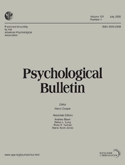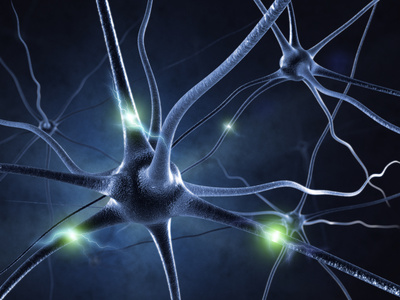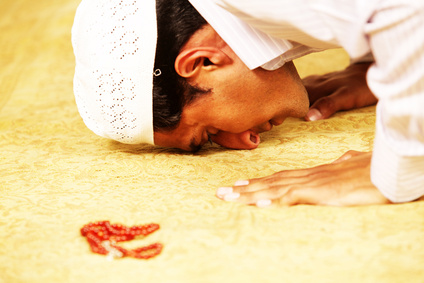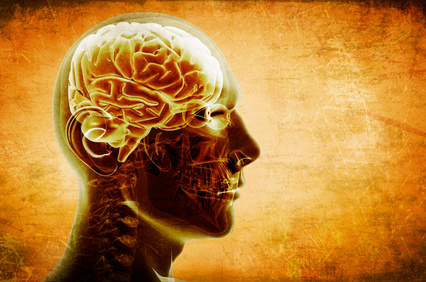Religion makes patients hold on to life
Many think of religion as a source for reassurance and comfort in the face of death. Often the highly religious are expected to be more inclined to accept their end than those without the hope of eternal reward or a sense of divine providence guiding events. However, as the Terri Schiavo case highlighted, the deeply religious regularly opt for extraordinary means to maintain life, even in the face the extreme unlikelihood of recovery. In a new study published in JAMA, and reported in the New York Times, researchers have found that religiously devout patients with terminal cancer “were three times as likely as less religious ones to be put on a mechanical ventilator…during the last weeks of life.” It seems that far from encouraging a peaceful passing, highly religious patients hold on to life whatever the costs, be they monetary or in personal pain for themselves and their loved ones.
 IBCSR's Spirituality and Health Causation Project aims to move beyond the hundreds of correlational studies identifying the health effects of religious and spiritual practices to identify the causal, biochemical mechanisms that mediate spirituality-health connections. IBCSR's partners in this project are
IBCSR's Spirituality and Health Causation Project aims to move beyond the hundreds of correlational studies identifying the health effects of religious and spiritual practices to identify the causal, biochemical mechanisms that mediate spirituality-health connections. IBCSR's partners in this project are  Few would be surprised that religious people have greater self-control than others. With all those rules and highly choreographed social interactions (rituals) how could it be otherwise? According to a new study by psychologists Michael McCullough and Brain Willoughby at the University of Miami religious belief and piety does in fact promote self-discipline but not merely through external means of social control. Apparently, religious belief and practice contribute to “inner strength” which helps make believers less distracted and more able to focus on positive life tasks. McCullough and Willoughby “reviewed eight decades of research” in order to test six propositions related to religious belief, practice, and self-control. Even when controlling for self-selection bias, higher religiosity was found to be related to higher self-control.
Few would be surprised that religious people have greater self-control than others. With all those rules and highly choreographed social interactions (rituals) how could it be otherwise? According to a new study by psychologists Michael McCullough and Brain Willoughby at the University of Miami religious belief and piety does in fact promote self-discipline but not merely through external means of social control. Apparently, religious belief and practice contribute to “inner strength” which helps make believers less distracted and more able to focus on positive life tasks. McCullough and Willoughby “reviewed eight decades of research” in order to test six propositions related to religious belief, practice, and self-control. Even when controlling for self-selection bias, higher religiosity was found to be related to higher self-control. You’ve felt it before: the embarrassed, self-conscious realization that you’ve just committed a major error, made a mistake when you should have been performing better. We all experience this unpleasant feeling. Measuring electrical activity in the brain, researchers call it “error-related negativity,” relating it particularly to a part of the midbrain called the anterior cingulate cortex. New research indicates that religiousness may reduce activity in this part of the brain, physiologically buffering people against their own mistakes. Most interestingly, the source of this effect may be the generation of meaning itself.
You’ve felt it before: the embarrassed, self-conscious realization that you’ve just committed a major error, made a mistake when you should have been performing better. We all experience this unpleasant feeling. Measuring electrical activity in the brain, researchers call it “error-related negativity,” relating it particularly to a part of the midbrain called the anterior cingulate cortex. New research indicates that religiousness may reduce activity in this part of the brain, physiologically buffering people against their own mistakes. Most interestingly, the source of this effect may be the generation of meaning itself. It’s one of the most basic human experiences. The world and I are different things – the world is out there, and I’m looking out at all the action. But this division might not be so strict for everyone. Researchers in China have discovered that people from different cultures show distinctive patterns of neuronal activation when asked to think about themselves. Specifically, Tibetan Buddhists do not exhibit the typical brain activity associated with concepts of a self. This suggests that religious beliefs directly affect not only our neurology, but our fundamental experience of the world.
It’s one of the most basic human experiences. The world and I are different things – the world is out there, and I’m looking out at all the action. But this division might not be so strict for everyone. Researchers in China have discovered that people from different cultures show distinctive patterns of neuronal activation when asked to think about themselves. Specifically, Tibetan Buddhists do not exhibit the typical brain activity associated with concepts of a self. This suggests that religious beliefs directly affect not only our neurology, but our fundamental experience of the world. In 2006, scientists who worked on the John Templeton Foundation study of anonymous, intercessory prayer released their conclusion that such prayer does not aid in recovering from illness. However, religion may still play an important role in recuperating from disease. Religion can contribute to combating diseases in other ways than asking for supernatural intercession. Evolutionary biologist David Hughes (Pennsylvania State University, University Park) argues that religious social structures and how a group handles epidemics mutually shape each other.
In 2006, scientists who worked on the John Templeton Foundation study of anonymous, intercessory prayer released their conclusion that such prayer does not aid in recovering from illness. However, religion may still play an important role in recuperating from disease. Religion can contribute to combating diseases in other ways than asking for supernatural intercession. Evolutionary biologist David Hughes (Pennsylvania State University, University Park) argues that religious social structures and how a group handles epidemics mutually shape each other. Yoga has been prominent in the public eye recently – it seems like everyone from housewives to movie stars is suddenly carting around a yoga mat en route to their favorite studio (sending some Christian pastors
Yoga has been prominent in the public eye recently – it seems like everyone from housewives to movie stars is suddenly carting around a yoga mat en route to their favorite studio (sending some Christian pastors  The religious brain is hot stuff right now. Publications as diverse as Science and Newsweek seem to be gaga about how meditation affects the frontal cortex, how praying soothes the amygdala, or how religious belief affects the psyche. But there’s a catch to all this excitement: nearly all the research focuses on either Christian or Buddhist forms of religious practice. Where are the other religions? A team of researchers from Malaysia recently helped to answer this question by studying how Muslim prayer affects alpha waves in the brain, and their results show a profound connection between mind and body.
The religious brain is hot stuff right now. Publications as diverse as Science and Newsweek seem to be gaga about how meditation affects the frontal cortex, how praying soothes the amygdala, or how religious belief affects the psyche. But there’s a catch to all this excitement: nearly all the research focuses on either Christian or Buddhist forms of religious practice. Where are the other religions? A team of researchers from Malaysia recently helped to answer this question by studying how Muslim prayer affects alpha waves in the brain, and their results show a profound connection between mind and body. Why do we humans have things like rites, rituals, prayers, and beliefs? Many might answer that they help us to find meaning and purpose in life, feel connected with something greater, or ward off fear of death. But spirituality also often helps with something else: health and well-being. From Siberian shamans who also function as healers to the growing modern interest in mind-body medicine, spirituality is deeply entwined with our quest for wholeness. Now, researchers are finding that spirituality can help patients cope with one of the most challenging diseases of all: cancer.
Why do we humans have things like rites, rituals, prayers, and beliefs? Many might answer that they help us to find meaning and purpose in life, feel connected with something greater, or ward off fear of death. But spirituality also often helps with something else: health and well-being. From Siberian shamans who also function as healers to the growing modern interest in mind-body medicine, spirituality is deeply entwined with our quest for wholeness. Now, researchers are finding that spirituality can help patients cope with one of the most challenging diseases of all: cancer. People have speculated over the value of meditating for thousands of years. Meditating seems to improve people’s mood, increase their self-awareness, and help them relax. Of course, mere hearsay will not convince neurologists—only empirical investigation will. To that end, a group of researchers headed by the Massachusetts General Hospital (MGH) recently investigated to see if there are any benefits to meditation, finding that persistent meditation can increase gray matter density in the brain.
People have speculated over the value of meditating for thousands of years. Meditating seems to improve people’s mood, increase their self-awareness, and help them relax. Of course, mere hearsay will not convince neurologists—only empirical investigation will. To that end, a group of researchers headed by the Massachusetts General Hospital (MGH) recently investigated to see if there are any benefits to meditation, finding that persistent meditation can increase gray matter density in the brain. In recent years, much ado has been made about mindfulness meditation. Researchers and psychologists have found strong, persistent connections between meditation and enhanced executive cognitive functions – that is, high-level brain processes, like attention switching, planning, and impulse control, that depend on the frontal cortex region of the brain. But now investigators are finding that meditation may help develop bottom-up cognitive processes as well. In fact, new research from the Netherlands shows that people with experience in meditation may be better at automatic information processing, which depends on some of the oldest parts of the brain.
In recent years, much ado has been made about mindfulness meditation. Researchers and psychologists have found strong, persistent connections between meditation and enhanced executive cognitive functions – that is, high-level brain processes, like attention switching, planning, and impulse control, that depend on the frontal cortex region of the brain. But now investigators are finding that meditation may help develop bottom-up cognitive processes as well. In fact, new research from the Netherlands shows that people with experience in meditation may be better at automatic information processing, which depends on some of the oldest parts of the brain.
 In the United States, religion is usually said to be a personal affair – one’s own private decision about how and what to believe. But this remarkably private and individualistic approach is somewhat odd when compared with the vast majority of cultures and religions throughout history. Far more often, religion has been a public affiliation, determining cultural identities, affecting marriage and family choices, and defining groups in relation to each other. A fascinating recent study published in PLOS Genetics shows just how inextricable religion often is from culture, finding that religious identity has decisively shaped the genetic landscape of the Levant - so decisively, in fact, that Lebanese Muslims are more closely related to fellow Muslims from Morocco or Yemen than they are to their Christian or Jewish compatriots.
In the United States, religion is usually said to be a personal affair – one’s own private decision about how and what to believe. But this remarkably private and individualistic approach is somewhat odd when compared with the vast majority of cultures and religions throughout history. Far more often, religion has been a public affiliation, determining cultural identities, affecting marriage and family choices, and defining groups in relation to each other. A fascinating recent study published in PLOS Genetics shows just how inextricable religion often is from culture, finding that religious identity has decisively shaped the genetic landscape of the Levant - so decisively, in fact, that Lebanese Muslims are more closely related to fellow Muslims from Morocco or Yemen than they are to their Christian or Jewish compatriots.  Most religions preach forgiveness. Holding grudges, remembering wrongs, and not letting things go leads to poor spiritual health (according to such religions). While scientists cannot test claims about spiritual health, they can test physical health. Can forgiveness lead to improved health? Researcher Michael McFarland (University of Texas at Austin) and colleagues posed this question, and found that forgiveness does positively correlate with health over time.
Most religions preach forgiveness. Holding grudges, remembering wrongs, and not letting things go leads to poor spiritual health (according to such religions). While scientists cannot test claims about spiritual health, they can test physical health. Can forgiveness lead to improved health? Researcher Michael McFarland (University of Texas at Austin) and colleagues posed this question, and found that forgiveness does positively correlate with health over time. Guilt: it’s no fun. Knowing that we’ve harmed or let down someone we care about leads us to feel blue, self-conscious, and eager to make amends. However, many psychologists have suggested that the emotion of guilt is actually a highly useful social tool, because it inspires people to reach out in an attempt to repair injured relationships. But what if the work people put into making things right comes at the expense of others who haven’t done anything wrong at all?
Guilt: it’s no fun. Knowing that we’ve harmed or let down someone we care about leads us to feel blue, self-conscious, and eager to make amends. However, many psychologists have suggested that the emotion of guilt is actually a highly useful social tool, because it inspires people to reach out in an attempt to repair injured relationships. But what if the work people put into making things right comes at the expense of others who haven’t done anything wrong at all? Long-term meditators know that meditation can change people’s experience of the world, usually for the better. Highly experienced practitioners of meditation often report greater feelings of equanimity, patience, and compassion for others – even at times when they’re not meditating, such as during the workday or at dinner with family. Now researchers at the University of Bonn in Germany say they have an explanation for the new states of consciousness that arise as a result of meditation – gamma brain wave states, associated with expert-level meditation, assist in the reshaping of brain structures that persist beyond actual periods of meditation.
Long-term meditators know that meditation can change people’s experience of the world, usually for the better. Highly experienced practitioners of meditation often report greater feelings of equanimity, patience, and compassion for others – even at times when they’re not meditating, such as during the workday or at dinner with family. Now researchers at the University of Bonn in Germany say they have an explanation for the new states of consciousness that arise as a result of meditation – gamma brain wave states, associated with expert-level meditation, assist in the reshaping of brain structures that persist beyond actual periods of meditation. From the mythical fountain of youth to modern cryogenics, the desire to extend our lives runs deep in the human psyche. Peruse any magazine stand and you’re likely to find a dozen ways to maximize your stay on planet Earth. Some are obvious: eat healthy, exercise, and don’t abuse yourself with drugs and alcohol. Other solutions are a bit more surprising: drink green tea, eat dark chocolate, and own a pet or two. Even more counterintuitive (and perhaps less self-congratulatory) than enjoying chocolate, a recent study suggests that longevity is also linked to your readiness to forgive those who harm you.
From the mythical fountain of youth to modern cryogenics, the desire to extend our lives runs deep in the human psyche. Peruse any magazine stand and you’re likely to find a dozen ways to maximize your stay on planet Earth. Some are obvious: eat healthy, exercise, and don’t abuse yourself with drugs and alcohol. Other solutions are a bit more surprising: drink green tea, eat dark chocolate, and own a pet or two. Even more counterintuitive (and perhaps less self-congratulatory) than enjoying chocolate, a recent study suggests that longevity is also linked to your readiness to forgive those who harm you. People commonly say that “money can’t by happiness,” but such people do not bother economists. Economists like to quantify everything in terms of money, including happiness. And when they got wind of research that religion increases long-term happiness, they naturally asked, “By how much (in US dollars)?” More exactly, Timothy Tyler Brown (University of California, Berkeley) investigated the value of happiness prayer yields for the average individual per year in dollars, and found that the answer is $63,628.
People commonly say that “money can’t by happiness,” but such people do not bother economists. Economists like to quantify everything in terms of money, including happiness. And when they got wind of research that religion increases long-term happiness, they naturally asked, “By how much (in US dollars)?” More exactly, Timothy Tyler Brown (University of California, Berkeley) investigated the value of happiness prayer yields for the average individual per year in dollars, and found that the answer is $63,628. For some, religion is a way to achieve salvation – ensuring that, for example, one’s soul will be taken care of in the afterlife. But for many others, religion and spirituality are also about life in the here and now. Research in recent decades has suggested that religiosity and spirituality may be associated with a wide variety of positive life outcomes, such as less disease and higher overall well-being. Not everyone agrees, however. James Benjamin Schuurmans-Stekhoven (Charles Sturt University, Australia) thinks that it’s virtuous traits, not spirituality, that lead to a happier life, and he’s using statistics to prove his point.
For some, religion is a way to achieve salvation – ensuring that, for example, one’s soul will be taken care of in the afterlife. But for many others, religion and spirituality are also about life in the here and now. Research in recent decades has suggested that religiosity and spirituality may be associated with a wide variety of positive life outcomes, such as less disease and higher overall well-being. Not everyone agrees, however. James Benjamin Schuurmans-Stekhoven (Charles Sturt University, Australia) thinks that it’s virtuous traits, not spirituality, that lead to a happier life, and he’s using statistics to prove his point. It’s a familiar quote: “the family that prays together, stays together.” Folk wisdom says that participating in religious activities with a significant other is beneficial for the relationship, but now scientists are beginning to test that claim. Recently, a team of investigators looked at marriage training programs in African-American couples to find out whether prayer actually makes partnerships better. Like so many results in the study of religion and well-being, their findings leaned positive, but raised as many questions as they answered.
It’s a familiar quote: “the family that prays together, stays together.” Folk wisdom says that participating in religious activities with a significant other is beneficial for the relationship, but now scientists are beginning to test that claim. Recently, a team of investigators looked at marriage training programs in African-American couples to find out whether prayer actually makes partnerships better. Like so many results in the study of religion and well-being, their findings leaned positive, but raised as many questions as they answered.